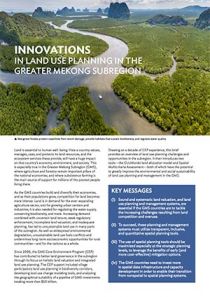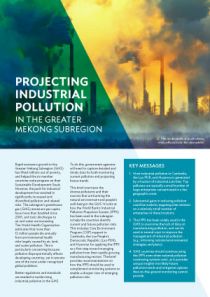German Funding to Strengthen Water Cooperation among Mekong Countries
Germany has committed 4 million euros ($4.6 million) to strengthen cross-border water cooperation in the Greater Mekong Subregion through the Mekong River Commission.
In the Greater Mekong Subregion, 200 million people in rural areas depend on their surrounding environment for food, water, energy, and income. Forests, wetlands, mangroves, farmlands, and other ecosystems account for between 20% and 55% of the subregion's wealth.
The Working Group on Environment (WGE) provides overall leadership and direction for the subregion's Core Environment Program.
Natural ecosystems – and the food, water, energy, and other vital elements they provide – lie at the heart of the development of the Greater Mekong Subregion. How these natural resources are protected, managed, and enhanced will determine the long-term sustainability of its environment and economic development.
Overexploitation of natural resources, pollution, vulnerability to climate change, and ever-increasing natural disasters are threatening these ecosystems. In addition, environmental degradation is posing risks to sustained long-term growth, and could cost a whopping $55 billion in foregone services over the next 25 years if left unchecked.
Unless there is better planning and management, the subregion’s resource-intensive development approach could lead to food shortages, price shocks, health hazards, and environmental damage that impact thousands of families and put businesses at risk.
The GMS Economic Cooperation Program Strategic Framework 2030 (GMS-2030) will focus on improving environmental sustainability and climate change resilience in the subregion. Environment and climate change challenges will be addressed through green technologies; protection of ecosystems and key ecological processes; climate resilience policies; and disaster-risk management, all of which will recognize the essential role that communities play as stewards of natural resources. A systematic effort will be made to mainstream climate change considerations into all GMS interventions, with a focus on energy efficiency, renewable energy, climate-smart landscapes, and sustainable waste management, particularly in terms of healthy ocean and river systems, and the tackling of plastic pollution. GMS-2030 was endorsed and adopted at the 7th GMS Summit of Leaders in September 2021. It aims to provide a new setting for the development of this subregion for the next decade.
The Core Environment Program Strategic Framework and Action Plan 2018-2022 was endorsed by GMS ministers at the 5th GMS Environment Ministers' Meeting in Chiang Mai, Thailand, held on 30 January – 1 February 2018. The 5-year environment strategy focuses on green technologies and sustainable infrastructure, natural resources and ecosystem services, and climate resilience and disaster risk management.
The GMS Climate Change and Environmental Sustainability Program (GMS CCESP), the third and current phase of the GMS Core Environment Program, supports environmental cooperation and green investments in the GMS. It covers six priority themes that were identified during the 24th Annual Meeting of the GMS WGE in 2019: (a) building climate and disaster resilience; (b) facilitating low carbon transitions; (c) promoting climate-smart landscapes; (d) enhancing environmental quality through pollution control and sustainable waste management; (e) deploying digital technologies for climate actions and environmental sustainability; and (f) financing low-carbon and climate-resilient infrastructure and technologies, including demonstrating climate and disaster risk financing instruments. The GMS CCESP builds on the achievements and lessons from the first two phases of the GMS Core Environment Program, and runs until 2025.
The GMS Core Environment Program was designed to help countries in the GMS meet the increasing demand for food, energy, water, and other natural resources, while at the same time ensuring that resources are available for future generations. This included balancing rapid growth with sustainable practices, and protecting vital water resources, controlling floods, preserving biodiversity and critical ecosystems, and mitigating the impacts of urban expansion.
Related
• GMS Core Environment Program website
• Greater Mekong Subregion Climate Change and Environmental Sustainability Program (Brochure)
Contact Persons
Focal Persons at the Asian Development Bank
Srinivasan Ancha
Climate Change, Resilience, and Environment Cluster
Climate Change and Sustainable Development Department
Mark Bezuijen
Agriculture, Food, Nature, and Rural Development Sector Office
Sectors Group
Other Concerned Staff & Consultants
Alvin Lopez
Agriculture, Food, Nature, and Rural Development Sector Office
Sectors Group
Criselda Rufino
Agriculture, Food, Nature, and Rural Development Sector Office
Sectors Group
Asadullah Sumbal
Regional Cooperation and Integration Unit
Southeast Asia Department
Rafaelita Jamon
Regional Cooperation and Integration Unit
Southeast Asia Department/GMS Secretariat
Send inquiries to GMS SAFSP Secretariat and GMS Secretariat.
Germany has committed 4 million euros ($4.6 million) to strengthen cross-border water cooperation in the Greater Mekong Subregion through the Mekong River Commission.

This brief provides an overview of land use planning challenges and opportunities in the Greater Mekong Subregion and introduces tools to improve land use planning and management in the subregion.
VIENTIANE, LAO PEOPLE’S DEMOCRATIC REPUBLIC (7 September 2018) — The Asian Development Bank and the Government of the Lao People’s Democratic Republic signed an agreement for a $40.5 million grant for the Climate-Friendly Agribusiness Value Chains Sector Project that will help farmers and agribusinesses develop sustainable and climate-smart agriculture value chains in the country.
VIENTIANE, LAO PEOPLE’S DEMOCRATIC REPUBLIC (31 July 2018) — The Asian Development Bank’s Board of Directors has approved a $40.5 million grant to help farmers and agribusinesses develop sustainable and climate-smart agriculture value chains in the Lao People’s Democratic Republic.

Applying the Industrial Pollution Projection System is an important first step toward mainstreaming pollution concerns into strategic planning in the Greater Mekong Subregion.
Cambodia and the Lao People’s Democratic Republic have agreed to strengthen joint efforts to fight illegal fishing practices and increase fish stock in the Mekong-Sekong basin.
High upfront costs and lack of incentives impede fuel efficiency initiatives in road freight in the Greater Mekong Subregion.
Increasing investments in natural capital requires a proper accounting of its economic value for informed policy and decision-making.
Myanmar is putting in place a national safeguards system to better balance rapid economic growth and environmental sustainability.
Government and development partners talk about the importance of environmental cooperation in the Greater Mekong Subregion and the GMS Core Environment Program.